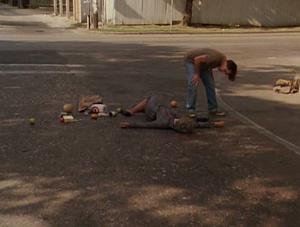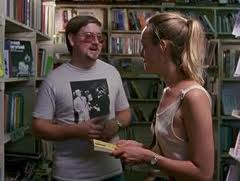This movie is enjoying its official 20-year anniversary, so I thought I’d reprint an article I wrote about it, “Stranger Than Texas,” which appeared in Film Comment’s July-August 1990 issue. Yes—1990: 21years ago. Here’s how that happened: I saw Slacker at a 10 a.m. screening at the Seattle International Film Festival in May ’90, drawn by a catalog description that made it sound like my kind of movie; in those days I killed a lot of time in bookstores and cafes, working on projects that never turned into anything or staring off into space or reading. And I liked Slacker a lot, and I interviewed Richard Linklater in a noisy hospitality suite at a downtown hotel. Film Comment editor Richard T. Jameson was supportive when I said I liked this little movie, which didn’t have a distributor but had something. Linklater wrote me with more information and a copy of his first film and a Slacker crew T-shirt, and two months later the piece appeared and John Pierson read it (his account here) and although Slacker would’ve connected up with him anyway (Linklater had already pitched it to him), I was excited that the FC piece had formed a bit of the connective tissue. Linklater invited me to visit the set of Dazed and Confused, but Film Comment didn’t have the budget to send me, and I didn’t have the budget to send me, so I didn’t go, a decision I have always regretted. Here’s the Slacker piece, a fond memory.
 Among the 140some movies jumbled together for this year’s 16th Seattle International Film Festival, perhaps none was more ingratiatingly odd than Slacker, a new low-budget feature by director-writer-producer Richard Linklater. The soon-to-be-27-year-old auteur shot Slacker in 16mm over a couple of months last summer in Austin, Texas. He says the movie comes out of five years’ worth of notebook scribbles and a long-gestating desire to make a film about a teeming assortment of characters who are essentially unconnected, except by the movement of the film itself. Slacker sweeps through the coffeehouses, bookstores, bedrooms, and nightclubs of Austin, and discovers a world of wiggy philosophers, bored romantics, conspiracy enthusiasts, people who vanish and leave behind fictional explanations written on postcards, people who are catching up on a lot of sleep. Slackers.
Among the 140some movies jumbled together for this year’s 16th Seattle International Film Festival, perhaps none was more ingratiatingly odd than Slacker, a new low-budget feature by director-writer-producer Richard Linklater. The soon-to-be-27-year-old auteur shot Slacker in 16mm over a couple of months last summer in Austin, Texas. He says the movie comes out of five years’ worth of notebook scribbles and a long-gestating desire to make a film about a teeming assortment of characters who are essentially unconnected, except by the movement of the film itself. Slacker sweeps through the coffeehouses, bookstores, bedrooms, and nightclubs of Austin, and discovers a world of wiggy philosophers, bored romantics, conspiracy enthusiasts, people who vanish and leave behind fictional explanations written on postcards, people who are catching up on a lot of sleep. Slackers.
Linklater is a Houston-born college dropout who eschewed film school in favor of the joys of dinking around with a super-8 camera. “I think film school’s real overrated,” he says. “You spend all year and make maybe one little five-minute movie with three people. Why not just go and make movies?”
Which is exactly what Linklater did. His first feature, It’s Impossible to Learn to Plow by Reading Books, was a brooding, nearly nonverbal super-8 opus [“It was pretty good. It took place on a train”] that found a responsive audience in Monte Hellman. Linklater raised most of the money for Slacker from friends and relatives, plus, he says, “everything I could come up with—credit cards, savings. We ended up finishing the movie, we got our first answer print back, for 23,000 bucks.” A sale to West German television (they’ll have quite a subtitling job on their hands) and a deferment-friendly cast and crew helped Linklater complete the movie and even pay off investors.
Slacker takes its look and feel from Austin’s college-town, melting-pot atmosphere. “West Campus—my neighborhood—is where all the students who either quit, or have already graduated but haven’t moved on to what they’re gonna do, are hanging out,” says Linklater. “They’re just killing time. So their education continues, but along unsupervised paths—the quest for knowledge and all that vigor is still there, you know. But there’s no action. It’s all ideas and words, but there’s really nothing happening. It’s pre-action. I don’t know if the action ever starts….”
This movie has a form similar to La Ronde, Buñuel’s Phantom of Liberty, and, more recently, Chantal Akerman’s Toute Une Nuit: we follow a character only so long as he or she leads us to another character, then follow that person for a while, the another, and another…. Unlike the classical construction of La Ronde, Slacker never does circle back or return to any character. It simply travels across the warped, lonely, eccentric trajectories of dozens of peoples’ lives over a single dawn-to-dawn in Austin, dropping some souls just as they’re becoming interesting, allowing deadbeats to hang around a bit longer than they should, finding something appealing or distracting or just plain drop-dead peculiar in nearly everyone it glances across.
It begins with a guy arriving in Austin via bus and catching a taxi into town. (For a few seconds after the taxi drives out of the frame, the camera watches another cab pull into place—lingering over the possibility of another story about to start.) In the back of the cab, the guy, played by Linklater himself, performs the first of the film’s many offcenter monologues. With postgrad gee-whizdom he speculates on the way separate realities exist in the thing we decide not to do (like, what are the movies happening down each of the yellow-brick roads that Dorothy and the Scarecrow choose not to travel at that crossroads in The Wizard of Oz?). This crazy-quilt soliloquy sets the tone for the rest of the film, which drifts down roads not usually taken.
That’s one of the great things about Slacker: it’s full of the stuff that usually happens offscreen in movies, the scenes of quirkiness and tedium that generally disappear in favor of a plot. Since Slacker has no plot to advance, nothing is extraneous—everything in it is equally important and equally irrelevant. The most significant thing here is that the people keep moving, like fish swimming blindly upstream, and that they keep up their torrent of talk. Linklater’s people say the darndest things.
 Most of the actors are nonprofessionals, either friends of the director or people he approached in the street and hired on the basis of their offbeat looks or personality. (The improvised look of the film is carefully scripted, though Linklater worked with the actors to shape their roles.) A lot of these characters are not people you’d want to sit next to during a cross-country bus ride, but they make vivid cameos. An expert in JFK-assassination conspiracy theories (John Slate) corners a woman in a used bookstore and delivers a hilariously earnest description of the Oswald-Ruby vortex. An ebullient ne-punk (Teresa Taylor) tries to sell a couple of acquaintances a true cultural relic: a Madonna pap smear. A UFO-spotter tags alongside a young man and lays out a theory connecting fake moon landings (“You know about the suppressed transmission, of course? No? Well…”), U.S.-Soviet relations, and disappearing children. “I just thought you ought to know,” he says at the end of it all—a line that characterizes many of the movie’s ear-benders.
Most of the actors are nonprofessionals, either friends of the director or people he approached in the street and hired on the basis of their offbeat looks or personality. (The improvised look of the film is carefully scripted, though Linklater worked with the actors to shape their roles.) A lot of these characters are not people you’d want to sit next to during a cross-country bus ride, but they make vivid cameos. An expert in JFK-assassination conspiracy theories (John Slate) corners a woman in a used bookstore and delivers a hilariously earnest description of the Oswald-Ruby vortex. An ebullient ne-punk (Teresa Taylor) tries to sell a couple of acquaintances a true cultural relic: a Madonna pap smear. A UFO-spotter tags alongside a young man and lays out a theory connecting fake moon landings (“You know about the suppressed transmission, of course? No? Well…”), U.S.-Soviet relations, and disappearing children. “I just thought you ought to know,” he says at the end of it all—a line that characterizes many of the movie’s ear-benders.
But this film is no geekshow. Many of the characters achieve something like poignance. A memorable sidewalk scene: a woman from India, describing her homeland, pauses and tells her companion, “The next person who passes us will be dead within a fortnight.” Down the sidewalk and into the frame comes a poor, dear, hapless fellow (Frank Orral, lead singer of Poi Dog Pondering), whose subsequent disastrous encounters at a newspaper box and a coffeeshop suggest that, indeed, his days are surely numbered. For all this scene’s comedy—our last impression of the guy is the offscreen sound of a car screeching to a halt, roughly from the place where we saw him walk into the street—there’s something sweet and haunting about this encounter.
Slacker weaves its way through this digressive population as they cling to whatever will get them through the day—a cause or a conspiracy, a cup of coffee or a newspaper, anything to fill in the all-too-available hours. Linklater has a deadpan but always sympathetic approach to his people; his frequent method of playing scenes in long takes allows the characters to find their own rhythms, and eschews editorial comment. And just about the time you’re wondering how Linklater is going to wrap all this up, he glides into an unexpectedly giddy ending that also manages to be weirdly moving. This is a highly promising film. One character, who declares that he has given up on humanity at large, says, “I can only address myself to singular human beings now.” He’ll have to see Slacker—this movie is full of them.
Filed under: On Classics, On Directors | Tagged: Film Comment, Richard Linklater, Slacker | Leave a comment »









Slacker
This movie is enjoying its official 20-year anniversary, so I thought I’d reprint an article I wrote about it, “Stranger Than Texas,” which appeared in Film Comment’s July-August 1990 issue. Yes—1990: 21years ago. Here’s how that happened: I saw Slacker at a 10 a.m. screening at the Seattle International Film Festival in May ’90, drawn by a catalog description that made it sound like my kind of movie; in those days I killed a lot of time in bookstores and cafes, working on projects that never turned into anything or staring off into space or reading. And I liked Slacker a lot, and I interviewed Richard Linklater in a noisy hospitality suite at a downtown hotel. Film Comment editor Richard T. Jameson was supportive when I said I liked this little movie, which didn’t have a distributor but had something. Linklater wrote me with more information and a copy of his first film and a Slacker crew T-shirt, and two months later the piece appeared and John Pierson read it (his account here) and although Slacker would’ve connected up with him anyway (Linklater had already pitched it to him), I was excited that the FC piece had formed a bit of the connective tissue. Linklater invited me to visit the set of Dazed and Confused, but Film Comment didn’t have the budget to send me, and I didn’t have the budget to send me, so I didn’t go, a decision I have always regretted. Here’s the Slacker piece, a fond memory.
Linklater is a Houston-born college dropout who eschewed film school in favor of the joys of dinking around with a super-8 camera. “I think film school’s real overrated,” he says. “You spend all year and make maybe one little five-minute movie with three people. Why not just go and make movies?”
Which is exactly what Linklater did. His first feature, It’s Impossible to Learn to Plow by Reading Books, was a brooding, nearly nonverbal super-8 opus [“It was pretty good. It took place on a train”] that found a responsive audience in Monte Hellman. Linklater raised most of the money for Slacker from friends and relatives, plus, he says, “everything I could come up with—credit cards, savings. We ended up finishing the movie, we got our first answer print back, for 23,000 bucks.” A sale to West German television (they’ll have quite a subtitling job on their hands) and a deferment-friendly cast and crew helped Linklater complete the movie and even pay off investors.
Slacker takes its look and feel from Austin’s college-town, melting-pot atmosphere. “West Campus—my neighborhood—is where all the students who either quit, or have already graduated but haven’t moved on to what they’re gonna do, are hanging out,” says Linklater. “They’re just killing time. So their education continues, but along unsupervised paths—the quest for knowledge and all that vigor is still there, you know. But there’s no action. It’s all ideas and words, but there’s really nothing happening. It’s pre-action. I don’t know if the action ever starts….”
This movie has a form similar to La Ronde, Buñuel’s Phantom of Liberty, and, more recently, Chantal Akerman’s Toute Une Nuit: we follow a character only so long as he or she leads us to another character, then follow that person for a while, the another, and another…. Unlike the classical construction of La Ronde, Slacker never does circle back or return to any character. It simply travels across the warped, lonely, eccentric trajectories of dozens of peoples’ lives over a single dawn-to-dawn in Austin, dropping some souls just as they’re becoming interesting, allowing deadbeats to hang around a bit longer than they should, finding something appealing or distracting or just plain drop-dead peculiar in nearly everyone it glances across.
It begins with a guy arriving in Austin via bus and catching a taxi into town. (For a few seconds after the taxi drives out of the frame, the camera watches another cab pull into place—lingering over the possibility of another story about to start.) In the back of the cab, the guy, played by Linklater himself, performs the first of the film’s many offcenter monologues. With postgrad gee-whizdom he speculates on the way separate realities exist in the thing we decide not to do (like, what are the movies happening down each of the yellow-brick roads that Dorothy and the Scarecrow choose not to travel at that crossroads in The Wizard of Oz?). This crazy-quilt soliloquy sets the tone for the rest of the film, which drifts down roads not usually taken.
That’s one of the great things about Slacker: it’s full of the stuff that usually happens offscreen in movies, the scenes of quirkiness and tedium that generally disappear in favor of a plot. Since Slacker has no plot to advance, nothing is extraneous—everything in it is equally important and equally irrelevant. The most significant thing here is that the people keep moving, like fish swimming blindly upstream, and that they keep up their torrent of talk. Linklater’s people say the darndest things.
But this film is no geekshow. Many of the characters achieve something like poignance. A memorable sidewalk scene: a woman from India, describing her homeland, pauses and tells her companion, “The next person who passes us will be dead within a fortnight.” Down the sidewalk and into the frame comes a poor, dear, hapless fellow (Frank Orral, lead singer of Poi Dog Pondering), whose subsequent disastrous encounters at a newspaper box and a coffeeshop suggest that, indeed, his days are surely numbered. For all this scene’s comedy—our last impression of the guy is the offscreen sound of a car screeching to a halt, roughly from the place where we saw him walk into the street—there’s something sweet and haunting about this encounter.
Slacker weaves its way through this digressive population as they cling to whatever will get them through the day—a cause or a conspiracy, a cup of coffee or a newspaper, anything to fill in the all-too-available hours. Linklater has a deadpan but always sympathetic approach to his people; his frequent method of playing scenes in long takes allows the characters to find their own rhythms, and eschews editorial comment. And just about the time you’re wondering how Linklater is going to wrap all this up, he glides into an unexpectedly giddy ending that also manages to be weirdly moving. This is a highly promising film. One character, who declares that he has given up on humanity at large, says, “I can only address myself to singular human beings now.” He’ll have to see Slacker—this movie is full of them.
Filed under: On Classics, On Directors | Tagged: Film Comment, Richard Linklater, Slacker | Leave a comment »